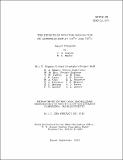The effects of reactor irradiation on Santowax OMP at 610°F and 750°F
Author(s)
Sawyer, Craig D. (Craig Delany)
Download855923283.pdf (29.07Mb)
Other Contributors
Massachusetts Institute of Technology. Department of Nuclear Engineering
U.S. Atomic Energy Commission. Idaho Operations Office
Metadata
Show full item recordAbstract
Santowax OMP has been irradiated in the M.I.T. In-Pile Loop Facility at 610°F and at 750°F. At both temperatures the loop was operated in a transient phase and a steady-state-HB phase. In the transient phase, unirradiated material was allowed to degrade to 60 w/o DP. In the steadystate- HB phase, the HB content of the coolant was maintained constant at about 33 w/o by the removal and distillation of samples and the replacement of the HB by unirradiated material before returning the samples to the loop. Neutron and gamma ray doses were measured with adiabatic calorimeters and foil monitors. The average dose rate to the coolant in the core region of the in-pile section was about 0. 5 watts/gm, of which 37% was due to fast neturon interactions and 63% to gamma ray interactions. Terphenyl concentrations were measured by gas chromatography and HB concentrations by distillation. Analysis of the transient phase terphenyl concentration and absorbed dose data showed that first order kinetics provided an adequate description of the degradation rate of the terphenyls. At 610°F no significant difference in the stabilities of the terphenyl issomers was found and the overall degradation rate of the coolant was G*(-omp) = G(-omp)/Comp = 0. 26 ± 0. 01 molecules of terphenyl degraded per 100 ev absorbed in the terphenyls. At 750°F the terphenyl isomer stabilities were in the order para>meta>ortho. After corrections for out-of-pile pyrolysis the overall degradation rate of the coolant was G*(-omp) = 0. 49 ± 0. 02. The results are compared to those of other investigations. For the 610°F irradiation the radiolytic gas generation rate was G(total gas) = 0.037 ± 0.003 molecules of gas produced per 100 ev absorbed in the coolant mixture, the principal product being hydrogen. During the 750°F irradiation the generation rate was G(total gas) = 0.105 ± 0.008, with a marked increase in the evolution of methane. Physical property measurements included density, viscosity, specific heat, thermal conductivity, number average molecular weight, gas solubility, carbon-hydrogen content and ash content. The increase in viscosity with increasing DP concentration was significantly less for the 750°F irradiation than for the 610*F irradiation. Heat transfer measurements showed that standard correlations could be used to determine the heat transfer rates using the physical properties of the irradiated coolant. The correlation obtained for the data of both irradiations was Nu = 0. 0079(Re)0.9(Pr) 0 . 4 ± 10%. No evidence of scale buildup on the heat transfer surfaces was observed over the entire period of operation of the experiment. The results of preliminary measurements with a fouling probe are also reported.
Description
"September 1963." "IDO-11, 107." Also issued by the first author as an Sc. D. thesis, Massachusetts Institute of Technology, Dept. of Nuclear Engineering, 1964 Includes bibliographical references
Date issued
1963Publisher
Cambridge, Mass. : Massachusetts Institute of Technology, Dept. of Nuclear Engineering, [1963]
Series/Report no.
IDO-11, 107MITNE ; no. 39